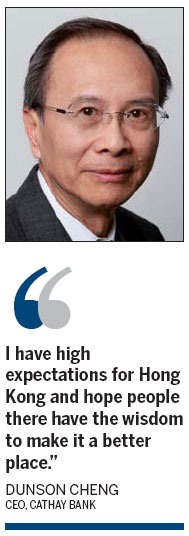Cathay's top banker recalls HK roots, ponders future
Updated: 2012-06-29 11:02
By Wang Jun in Los Angeles (China Daily)
|
||||||||
Cathay Bank has been serving the Chinese-American community since 1962, adapting to growth and change while the bank and its clientele expanded beyond their Southern California base.
For CEO Dunson Cheng, who has been along for more than half the journey, going from trained scientist to top banker adds a third parallel to the narrative.
"Cathay Bank was started 50 years ago with a commitment to serve Chinese immigrants. At that time there were only about 20,000 Chinese living in Los Angeles County" along with some 1,500 families clustered in the city's Chinatown, Cheng said.
When it opened half a century ago, the stand-alone bank had about half a million dollars in its vault. Today, as the main operating unit of Nasdaq-listed Cathay General Bancorp, it has over $10 billion in assets and 50 branches - one for each year in business. More than half are in California, but six other states have at least one Cathay Bank location.
And since 1985, the year Cheng became CEO, there has been a branch in Hong Kong. He was born in Vietnam but raised in the territory while it was under British colonial rule. He left in 1963 to attend college in the United States.
Cheng studied physics, earning a doctorate from the State University of New York at Stony Brook in 1971. That led to further academic work, in Oregon, and then a job with Xerox Corp.

During these years, Cheng's father moved from Hong Kong to Los Angeles, where he befriended Cathay's founder, George Ching. By 1982, that connection and his own business acumen landed Cheng a seat on the bank's board of directors; he joined management as Ching's special assistant, was named CEO in 1985 and then chairman in 1995.
Cathay Bank established a representative office in Hong Kong in 1985. Every year since then he has traveled back to Hong Kong.
"The word 'cathay' means China," Cheng said. "There will be more and more immigrants from China in the United States. Financially speaking, Chinese people are doing much better. Cathay Bank will do better as well."
Cheng recalled that in the 1990s some residents began leaving the territory as 1997 approached when Hong Kong was scheduled to revert from British rule back to China. They immigrated to Canada, Australia and even some African countries. "They wondered whether our main street, Queens Boulevard, would be renamed Liberation Boulevard after 1997," he said.
"Most of my schoolmates and friends back in Hong Kong were in their mid-40s at that time. They had built up their careers to a certain level and gotten financially established as well. It was hard for them to leave and start all over again in a new country. Many sent their wives and children abroad, which resulted in permanent separation or divorce in many families."
The bicoastal Cheng was in Hong Kong to see firsthand its return to China on July 1, 1997.
"Uncertainty brings fear; the central government understood that," he said. "Starting from many years before the return, the government put a lot of effort into supporting the Hong Kong economy."
Beijing "also took overseas Chinese into consideration and informed us about the Hong Kong situation," Cheng said. He recalled that before the return, Lu Ping, then director of the State Council's Hong Kong and Macao Affairs Office, led a 40-member delegation to Los Angeles to meet Chinese-American community leaders.
Among the delegates Cheng remembers meeting were Leung Chun-ying, now chief executive-elect of Hong Kong ("He was very young at that time"), and Rita Fan, a career public servant who became the first president of the post-handover Hong Kong Legislative Council.
In the 15 years since the return, Cheng said the main difference he has noticed is consistent economic growth in the special administrative region.
"Hong Kong has received enormous support from the mainland. Tourists from the mainland have been a big stimulus to the Hong Kong economy," Cheng said, adding that Cathay Bank upgraded its Hong Kong representative office to a full-service branch in 2007. Given increased business with mainland Chinese companies, the company plans to do the same with its Shanghai representative office.
In terms of politics, Cheng pointed to the formation of parties in Hong Kong since 1997.
"I saw people express their political views in street demonstrations when I traveled back to Hong Kong after the return," he said. "Now people express all kinds of views, sometimes in even more aggressive ways than people do in the United States."
"I have high expectations for Hong Kong and hope people there have the wisdom to make it a better place," Cheng added.
Contact the writer at wangjun@chinadailyusa.com

 Relief reaches isolated village
Relief reaches isolated village
 Rainfall poses new threats to quake-hit region
Rainfall poses new threats to quake-hit region
 Funerals begin for Boston bombing victims
Funerals begin for Boston bombing victims
 Quake takeaway from China's Air Force
Quake takeaway from China's Air Force
 Obama celebrates young inventors at science fair
Obama celebrates young inventors at science fair
 Earth Day marked around the world
Earth Day marked around the world
 Volunteer team helping students find sense of normalcy
Volunteer team helping students find sense of normalcy
 Ethnic groups quick to join rescue efforts
Ethnic groups quick to join rescue efforts
Most Viewed
Editor's Picks

|

|

|

|

|

|
Today's Top News
Health new priority for quake zone
Xi meets US top military officer
Japan's boats driven out of Diaoyu
China mulls online shopping legislation
Bird flu death toll rises to 22
Putin appoints new ambassador to China
Japanese ships blocked from Diaoyu Islands
Inspired by Guan, more Chinese pick up golf
US Weekly

|

|







